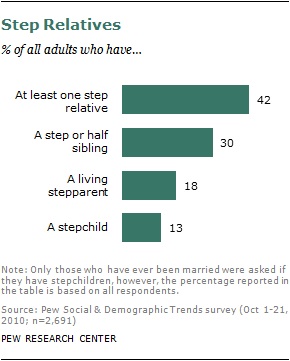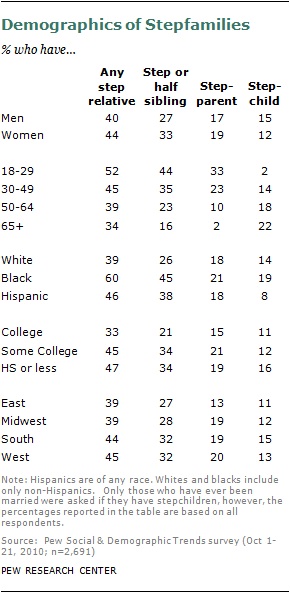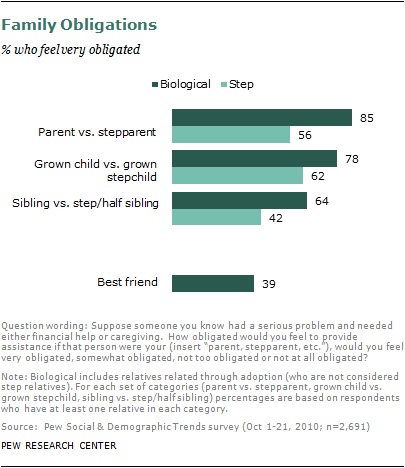The Pew Research Center recently released data on stepfamilies in the U.S. Of the 2,691 respondents, over 40% had at least one step relative in the immediate family:
Note that they include both step- and half-siblings. For readers who might not be familiar with that language, a step-sibling is related to you only through marriage; you don’t share a biological parent. A half-sibling shares one parent with you, but not both. I can see the point of including both categories if you’re interested in seeing the degree to which American family life varies from the culturally-accepted “ideal” nuclear family, but I would think putting both in a single category might hide meaningful differences (such as for the question about obligation, below).
The chances of having a step-relative in the immediate family vary quite a bit based on demographics, reflecting differences in marriage, divorce, and non-marital childbearing rates:
The vast majority (70%) of people with step-relatives said they were very satisfied with their family lives, undermining some of the cultural stereotypes of stepfamilies as inherently filled with conflict. However, the survey also asked participants if they would feel “obligated” to help a family member who was facing serious problems and needed either financial help or caregiving. The results show more feelings of obligation to biological family members than to step-relatives:
I presume perceptions of obligation vary widely based on how old a person was when their parent married their stepparent, the quality of the relationship, and perhaps even whether the stepparent has biological children. The data would seem to have important implications for our ability to draw on family networks for resources. Who is responsible for caring for elderly parents, for instance? Only their biological children? Should someone feel obligated to help a person who they’re related to only because of a parent’s marital choice? Unclear cultural norms about obligations to step-relatives bring up a number of complex issues that many Americans will be forced to grapple with in the future.




Comments 17
Basiorana — March 6, 2011
"Should someone feel obligated to help a person who they’re related to only because of a parent’s marital choice?"
Technically, why should I be obligated to help my biological sibling? It was not my choice that my parents had more than one child, it was theirs.
I figure I am obligated to help my parents as they cared for me and raised me, so I should help them out in return; my children, as I chose to have them; my spouse, as I agreed to marry them; and my spouse's children, as I chose to marry him knowing he had children.
I would probably help my siblings, step siblings, half siblings, step parents, best friend, etc, but not out of obligation-- I would not feel like I had to, just that it would be nice if I did.
JGH2 — March 7, 2011
It bothers me that half-siblings and step-siblings are equated, but only out of a personal bias. I consider my half-sister my "blood" - there's no "half" about it. It offends me when people emphasize that.
As for my step-siblings... we're not close, nor will we ever be.
Of course, every family situation is different.
Anonymous — March 7, 2011
I think most people could figure, and it looks as though the facts bear this out, that step-parents would generally feel less obligation toward their step-children. And yet, the government, for its own convenience, I think, chooses to ignore this.
On the FAFSA, which determines how much aid one is given for college (and indeed, for many, how able they are to attend *at all*), you are required to provide step-parents' financial information, which will then affect your aid award. For me, this meant including my step-father's info, even though my mom married him after I was grown and out of the house. I saw no reason that he would feel particularly compelled to help pay for the college education of a grown child he barely knew. And, of course, he didn't help pay. (But, to be fair, neither did my mom.) So, all of a sudden, because my mom made the decision to get married, I was going to lose money that I relied on to put myself through school, because the government assumed this shiny new parent was going to help. In the end, I lied on my FAFSA and pretended as though my mom was still unmarried. It was a risky move (thankfully, it wasn't noticed), but one I had to make in order to stay in school. I was backed into a financial corner.
And I don't think it should be that way. Really, I don't think that financial aid should rely on one's parents' income at all. I knew too many people in school whose parents were quite well off and yet, for one reason or another (often due to the parents disapproving of something, such as sexual orientation), the parents didn't help at all with college expenses. But, because the parents' income was high, the students couldn't get financial aid. The things some of them had to do to get through school were quite sad, and others had to drop out because they couldn't make it work.
It's the same if your parents refuse to provide their information. You cannot get financial aid. I had this problem one year, as well, because my mom decided that not paying her taxes was a great form of political protest, despite my vigorous objections. And I still fail to see what her (very stupid) decision should have to do with me. I can't force my mother to marry or not marry someone, to pay or not pay her taxes. Why should I be punished for it? Why should anyone?
I know I've gone off topic a bit, and I apologize, but this has long been a sore point for me, when it comes to the subject of parental obligations.
Simone Lovelace — March 7, 2011
This is fascinating.
I had no idea blended families were so common. I have a stepmom, and she and my (biological father) have an adopted infant son, whom I view as a brother. It's nice to know that there are some many families which are "like us."
Waiting Room Reading 3/11…Plus Time Mag Articles « Welcome to the Doctor's Office — March 11, 2011
[...] DATA ON STEPFAMILIES by Gwen Sharp [...]
Heather — March 16, 2011
My Father married my "step mom" when I was in my mid 20's. I've never really thought of her as a "step mom". I refer to her by her name when I speak to her etc.. They also live 4 states away and I only see my dad and her about once a year. She has 2 grown adult children. One of which i have never met. The other I met briefly when I was 17. The "step" brother that I had briefly met when I was younger has recently contacted me, and we have become romatically involved. I am now 37 years old and it has litteraly been 20 years since I had first met him and have had no contact with him since then. Is this wierd by sociological standards? I would like to know what people think of this situation.
Louise — March 20, 2011
As a step parent I completely understand feeling less obligation to a step child. I love my step children, but frankly they don't need me very much. Which is not to say that I don't add value to their lives with my presence, but they already have two biological parents and a whole extended family who cared for them long before I came along and still do. If there was something they needed that the rest of their family couldn't provide I would have no problem giving it (within the limits of my/our parenting ethos).
Baj — November 20, 2019
I think that combining half siblings with step siblings completely wrecks the research. There will be huge differences in mental and social health and reliance on families for resources. There may be less food and housing insecurity though.
Baj — November 20, 2019
I think that combining half siblings with step siblings completely wrecks the research. There will be huge differences in mental and social health and reliance on families for resources. There may be less food and housing insecurity than in single parent families though.